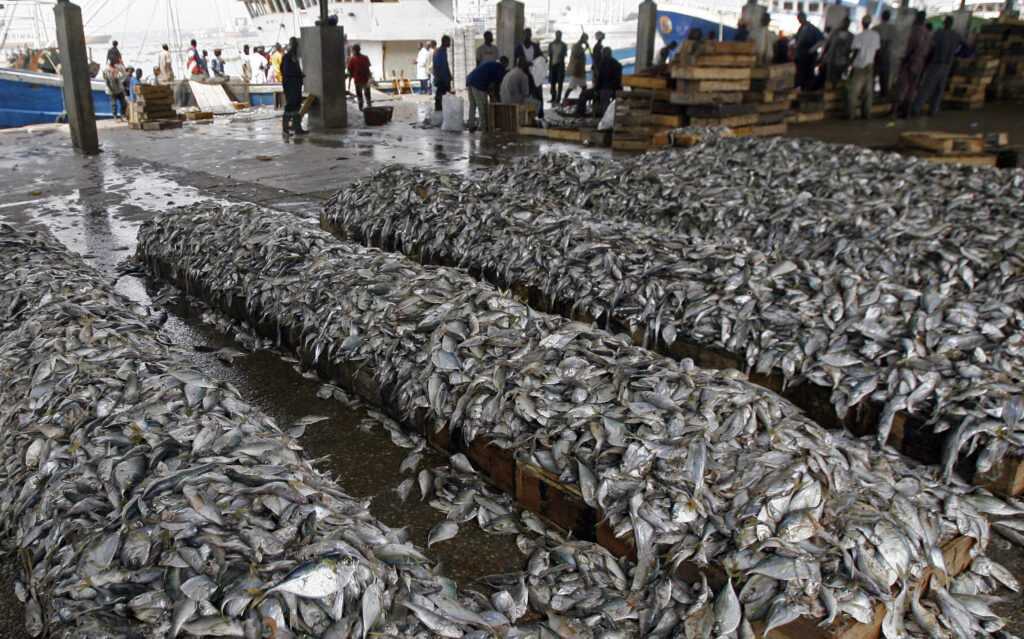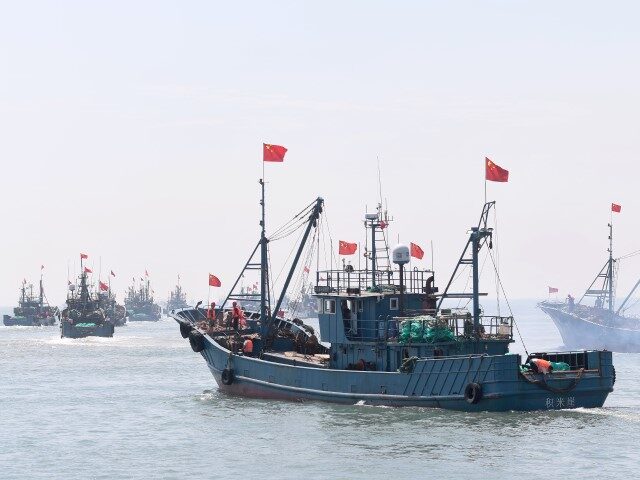The Congressional-Executive Commission on China (CECC) heard testimony on Tuesday that companies based in China are using forced labor from North Koreans and Uyghur Muslims to process seafood for American consumption.
Experts told the panel that even U.S. military catering firms are buying fish caught and processed with slave labor.
The congressional hearing, wittily entitled “From Bait to Plate: How Forced Labor in China Taints America’s Seafood Supply Chain,” was inspired by reports from a group called the Outlaw Ocean Project (OOP) about the “rampant” use of forced labor by Chinese fishing firms.
The most recent of those reports asserted that “slavery is not gone, it has just moved out to sea.” The report chronicled the “pervasive” use of forced labor in the South China Sea, as “tens of thousands of migrants from Cambodia, Laos, and Myanmar” have been pressed into service to make up for manpower shortages.
China is not the only offender. Thailand has also been accused of forcing migrants into “brutal” fishing operations where they can neither complain about their treatment nor quit their terrible “jobs.” Much of this forced labor is extracted from very young boys, who work without breaks under the blazing hot sun with minimal food or drinking water.
OOP proclaimed China to be the “superpower of seafood,” and said its dominance has come at a “grave human cost,” as the Chinese fishing fleet is “prone to captive labor and plunder.”
The Chinese fishing fleet allegedly preys on naive Indo-Pacific villagers who are desperate for work and hear rumors that commercial fishing pays fairly well for unskilled labor. Some of these villagers are scooped up by shady “employment agencies” that promise them good positions with reputable South Korean or Japanese companies, only to dump them onto hideous Chinese slave ships where non-Chinese laborers are treated like animals, punished with beatings, and prevented from communicating with the outside world.
Survivors of the experience say the surest ticket to a vicious beating was attempting to leave their “jobs,” which paid a fraction of the money they were anticipating. Massive Chinese fishing vessels tend to operate at great distances from shore, so leaving or calling for help would be difficult in any event.
Voracious Chinese overfishing has depleted many of its local stocks, so the Chinese fishing fleet is spreading across the Pacific, devouring everything with fins and bullying everything with portholes. OOP noted that China is now hauling in over five billion pounds of seafood per year through distant-water fishing, generating $35 billion in revenue and sustaining 15 million jobs. Most of the Chinese fishing industry is state-owned, and, of course, all Chinese companies are state-controlled.

A view of fishes seized 27 December 2007 at the port of Abidjan, from two Chinese ships, “Far East I” and “Far East II”, which were intercepted using ‘bottom trawling,’ disregarding the national fishing laws. Ivorian fishing groups warned earlier this month of the threat to acquatic flora and fauna in their national waters from “exploitation and abusive practices” by Chinese fishing fleets. (KAMBOU SIA/AFP via Getty Images)
OOP said China has been using its immense Belt and Road Initiative (BRI) to expand its fishing operations by developing ports where it can “shirk taxes and avoid meddling inspectors.” The Chinese fishing fleet also conducts surveillance for the People’s Liberation Army (PLA) and serves as a seaborne “militia,” furthering China’s territorial ambitions by forcing other nations out of contested waters.
Meanwhile, Uyghur slaves and imported North Korean thralls labor in the massive seafood processing plants of coastal China, and a great deal of their product is exported to American shops and diners. The CECC hearing on Tuesday discussed ways to use the 2021 Uyghur Forced Labor Prevention Act (UFLPA) to crack down on slave-made seafood, but the sheer volume of the imports and difficulty of sourcing shipments make it a challenge.
CECC chair Rep. Chris Smith (R-NJ) noted OOP’s finding that “almost half of the Chinese squid fleet, 357 of the 751 ships we studied, were tied to human rights or environmental violations.” Over a hundred of those ships were monitored while fishing illegally or trespassing into other national waters.
“It is evident that the People’s Republic of China is not the sole party involved in these reprehensible practices. Governments – including our own – have been complicit in the procurement of tainted seafood,” Smith said.
The chairman also noted the grave security implications of China using its massive “maritime militia” to conduct surveillance and espionage activities.
“China, under Xi Jinping and the Chinese Communist Party, is willing to upend the rules of the global international order, and act in a lawless, predatory manner, both at sea and on land. It shows no respect for human rights writ large, let alone labor rights,” he declared.
CECC co-chair Sen. Jeff Merkley (D-OR) said that at least ten major seafood companies in China have been caught using forced labor from “more than a thousand Uyghurs and other predominantly Muslim ethnic minorities from the Xinjiang Uyghur Autonomous Region.”
“My colleagues and I are horrified to learn that this seafood processed by Uyghur forced laborers is reportedly entering the United States,” Merkley said, urging the Department of Homeland Security (DHS) and Customs and Border Protection (CBP) to take stronger action.
Merkley quoted OOP research that found “over one thousand tons of seafood have been exported to American importers by Chinese seafood-processing companies linked to North Korean labor,” in violation of the Countering America’s Adversaries Through Sanctions Act (CAATSA).
OOP founder and director Ian Urbina told the CECC that seafood is the “world’s last major source of wild protein” and the “largest globally-traded food commodity by value” – but it is also “harder to track than many other products,” because it is harvested on the high seas, where there is little oversight or enforcement of “what few murky rules exist.”
Urbina noted that labor laws are especially hard to enforce at sea because the “workplaces stay in constant motion,” and much of the crew is drawn from poor nations with minimal access to “political capital and legal recourse.”
Urbina memorably summed up the complex “bait to plate” supply chain:
It goes from fishing ship, to refrigeration ship, to port, to processor, to cold storage, to exporter, to US importer, to distributor or food service company, and then, finally, to restaurant, grocery store, or to public food pantry, military base, or public school. These many handoffs make it tougher to trace the true origin of the catch and to ensure that there is no forced labor or other environmental crimes in the supply chain.
Urbina dismissed China’s argument that “using Xinjiang workers is not illegal under Chinese law and that the use of these workers does not constitute forced labor because they receive proper living conditions, a salary, vocational training, and fair treatment.”
“U.S. seafood companies need to understand that this misses the point. Under U.S. law, any use of Xinjiang workers is deemed illegal because it occurs in the context of a larger government-run and coercive program, and whether these workers are paid or they tell auditors or state media that they are happy to have the job is not relevant,” he said, comparing the Uyghur situation to child labor law violations.
Georgetown University law professor Robert K. Stumberg testified that even fish billed as “locally” or “wild-caught” can be tainted by forced labor because “much of the fish coming out of U.S. waters and U.S.-flagged ships is frozen, sent to China for processing, refrozen, and then shipped back to the United States.”
Stumberg said it was difficult to determine even the amount of tainted seafood purchased by the United States government because the supply chains are so convoluted. He was not persuaded by the U.S. Department of Agriculture’s (USDA) assurances that all of the fish it purchases “must be grown and processed in the United States or its territories.”
“A contractor could assert that the U.S.-caught fish is available, but the domestic processing capacity is not,” he said. “Imagine the conversation: ‘Domestic processing has become too expensive. So why not process the fish in China? The processing won’t exceed 45% of the total cost. Besides, no one will ever know the difference.’”
Greg Scarlatoiu, executive director of the Committee for Human Rights in North Korea (HRNK), testified that Chinese seafood processing plants are “notorious for their reliance on forced or indentured labor, including that of North Korean workers.”
The Kim regime in Pyongyang simply sells its workers to other countries as if they were cattle, seizing most of their income as profit for the dictatorship – a practice so heinous that the United Nations Security Council banned the use of North Korean workers by other countries in 2019 and required their immediate expulsion.
Scarlatoiu noted the U.N. ban has “largely been ignored,” especially by China, which “continues to utilize North Korean overseas labor to the fullest extent possible.” The Chinese attempt to cover their tracks by deleting online records of North Korean employment, but some of the evidence remains – and it points to seafood processed by North Korean slaves being exported to American consumers.

COMMENTS
Please let us know if you're having issues with commenting.